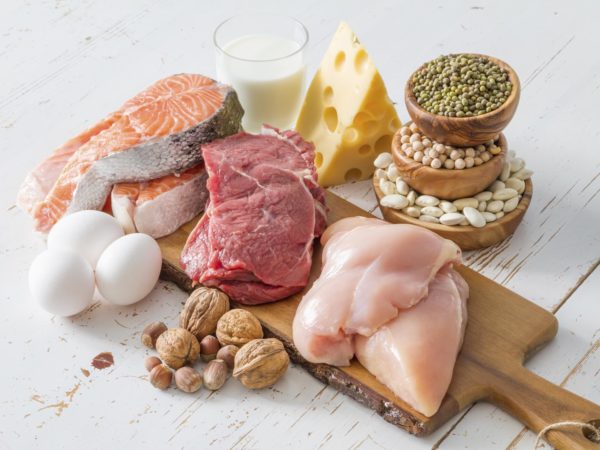Too Much Protein?
My son has been working out at the gym to build muscle. He is on a strict protein diet and insists on eating two to three eggs per day as his protein intake along with oatmeal. I think this can be dangerous. What is the recommended daily amount?
Andrew Weil, M.D. | September 6, 2011

I wouldn’t worry about his eating two to three eggs per day, but I would be concerned about his total protein intake. Egg whites are a great source of protein, and the yolks contain an astonishing array of essential fatty acids, vitamins and minerals, including vitamins A, D, E and K, plus iron.
As little as two ounces of a protein-rich food a day may be enough to prevent protein deficiency in most adults; four ounces will certainly do it. That means a four-ounce serving of meat or fish or chicken or cheese or tofu.
If you eat more protein than your body needs for growth, repair and maintenance of tissue, it is burned as a fuel, just as carbohydrates and fats are. However, protein is not nearly as efficient a fuel as carbs or fats – the body has to work harder to dismantle its molecules and release their energy. The ratio of energy gained to energy expended is not as favorable. High-protein diets impose a considerable workload on the digestive system and may contribute to feelings of fatigue and lack of energy. Another problem with protein as a fuel is that it does not burn clean. Because of its nitrogen content, protein leaves “ashes” when it burns; these toxic nitrogen wastes must be eliminated from the system, taxing the liver and kidneys.
I recommend strength training as part of an overall fitness program, but I am not in favor of high muscle-mass bodybuilding because of the popular emphasis on consumption of high-protein foods and amino acid supplements and, in some cases, the use of dangerous drugs (anabolic steroids). To my mind these practices are not part of preventive health maintenance. The bodybuilders I have known are not as a group any healthier than other people, and some of them are less healthy because of the ways they think about and treat their bodies.
Omega-3 fatty acids should be an important part of any diet, and as far as the recommended daily amount of protein my anti-inflammatory diet calls for two to six four-ounce servings of wild Alaskan salmon, herring, sardines or Alaskan black cod a week, along with one to two servings per week of omega-3 enriched eggs, natural cheese (one ounce equals one serving), skinless poultry or meat (three ounces per serving), or whole soy foods.
Andrew Weil, M.D.










